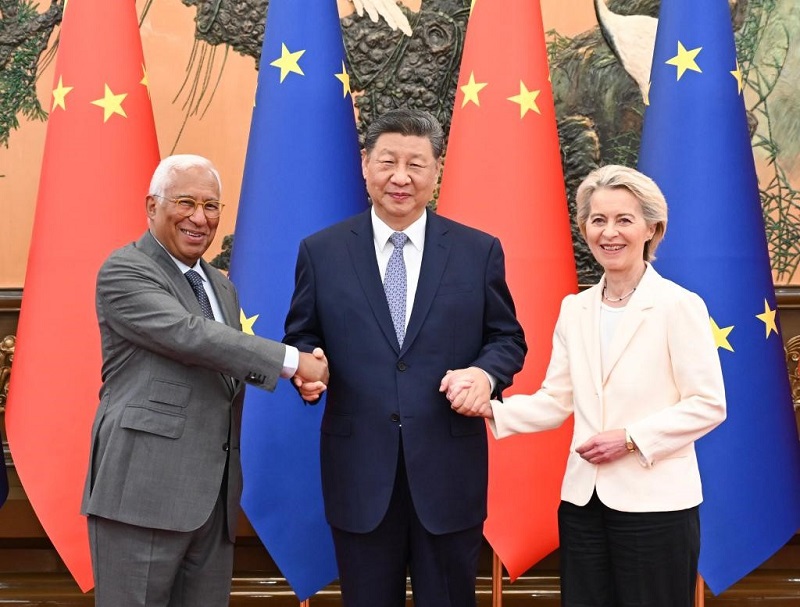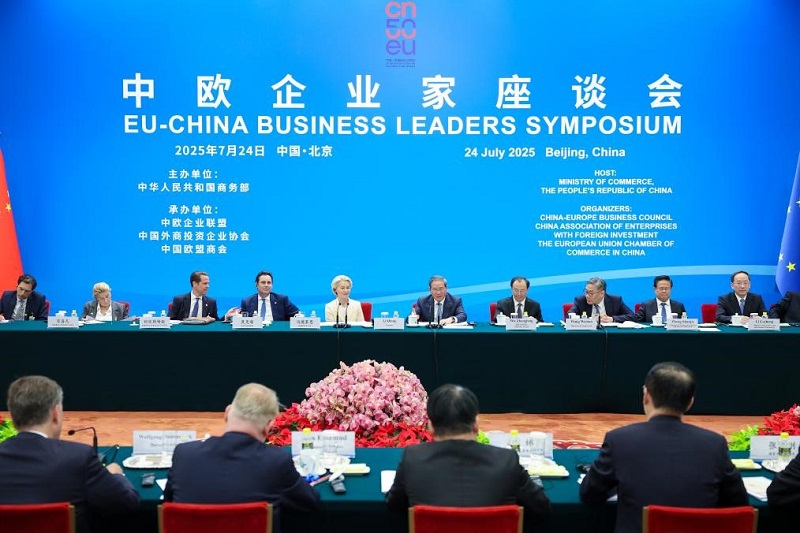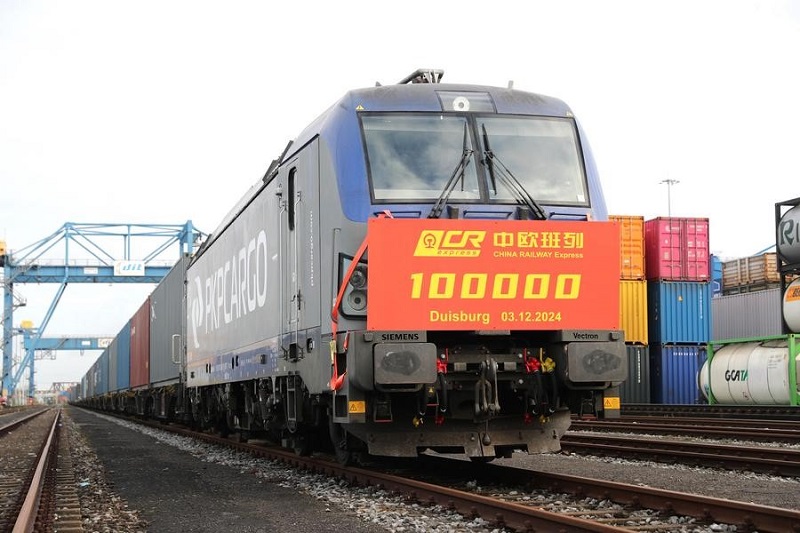Five decades ago, the establishment of China-EU diplomatic ties signaled a significant shift in the post-war world order. Today, as leaders gathered in Beijing for the 25th China-EU Summit commemorating this milestone, they faced a turbulent global landscape marked by geopolitical friction, economic uncertainty, and contested rules.
Against this backdrop, President Xi Jinping, meeting European Council President António Costa and European Commission President Ursula von der Leyen on July 24, 2025, put forth three proposals – upholding mutual respect to reinforce the partnership, championing openness and cooperation to manage differences and frictions, and upholding multilateralism to safeguard international rules and order. These proposals serve as a vital roadmap for steering one of the world’s most consequential bilateral ties through the challenges ahead.

Chinese President Xi Jinping meets with President of the European Council Antonio Costa and President of the European Commission Ursula von der Leyen, who are in China for the 25th China-EU Summit, at the Great Hall of the People in Beijing, capital of China, July 24, 2025. (Xinhua/Xie Huanchi)
Mutual Respect: The Indispensable Foundation Beyond Differences
Xi emphasized that historical, cultural, and systemic differences “have not impeded the establishment of China-EU diplomatic relations... nor should they obstruct the development of bilateral relations in the future.” This principle demands moving beyond tolerance to viewing differences as inherent characteristics demanding respect within a mature partnership.
The principle of mutual respect is deeply embedded in both Chinese and European cultural traditions. Chinese philosophy champions this value through the concept of “harmony in diversity,” emphasizing the importance of coexistence amid difference. Similarly, European thought embodies this spirit, exemplified by expressions like the British adage, “It takes all sorts to make a world,” and the vibrant French affirmation, “Vive la différence!” These perspectives, though geographically distinct, share a profound appreciation for respectful coexistence.
The aspiration for mutual respect has deep historical roots. In 1688, King Louis XIV of France wrote a letter to Emperor Kangxi of China’s Qing Dynasty, addressing him as “my very dear and good friend” and expressed his desire for cultural exchange. Although the letter never reached the emperor, five of the king’s mathematicians arrived in Beijing and facilitated the spread of Western mathematical, medical, and astronomical knowledge in China with two serving in the imperial court.
In a phone call with the President of the European Council Antonio Costa on January 14, 2025, Xi said, “The development history of China-EU relations demonstrates that as long as the two sides uphold mutual respect, treat each other as equals and engage in candid dialogue, they can advance cooperation and accomplish great things.”
Xi stressed that like-mindedness makes for partnership, and seeking common ground while respecting differences also defines partnership. The key lies in respecting the social systems and development paths chosen by each other’s people, as well as each other’s core interests and major concerns. Hence, China and the EU may have different opinions about certain issues, but mutual respect should serve as the right mindset for dealing with them.

Chinese Premier Li Qiang and President of the European Commission Ursula von der Leyen attend the China-EU Business Leaders Symposium at the Great Hall of the People in Beijing, capital of China, July 24, 2025. (Xinhua/Liu Bin)
Open Cooperation: The Strategic Imperative Against Fragmentation
Economic cooperation has long served as the bedrock of China-EU relations. As two of the world’s major economies, China and the EU have established a comprehensive strategic partnership and have evolved into each other’s important trading partners.
According to statistics, the annual trade volume between China and the EU has grown from US $2.4 billion at the time of the establishment of diplomatic relations to US $785.8 billion in 2024, and mutual investment stock has increased from almost zero to about US $260 billion.
Many European companies continue to invest in China, seeking mutual benefit. Mercedes-Benz is a case in point. Between 2014 and 2023, the company and its Chinese partners jointly invested over RMB 100 billion in China. In 2024, Mercedes-Benz announced an additional investment of RMB 14 billion in China alongside its partners. Those investments have not only supported its business growth but also contributed to China’s employment and development.
Ola Källenius, chairman of the board of management of Mercedes-Benz Group AG, called the Chinese market “a key pillar” of Mercedes-Benz’s global strategy and a crucial driving force for its transformation at this year’s China Development Forum in March. “Mercedes-Benz remains committed to long-term investment in China. We believe that China’s continued policy of opening up to the world will further unlock the potential of its market,” he said.
Beyond automotive giants, companies like Bosch are investing in future technologies. Its €950 million investment in the development and production of components for electromobility and automated driving in Suzhou exemplifies cooperation pivoting towards critical new energy sectors, highlighting depth beyond traditional industries.
While economic cooperation lays the practical foundation for bilateral relations, cooperation in people-to-people exchanges enhances mutual understanding. During his visit to France in May 2024, Xi announced that China will promote the number of French students studying in China to over 10,000 within the next three years and double the scale of European youth exchanges in China.
Under such a context, the event “Gathering at China Today Salon – The Bridge of Peace: Dialogue Between Greater Bay Area and European Youth Leaders” was held at China Today • Macao Salon in Hengqin, south China’s Guangdong Province in July 2025. It attracted over 80 youth representatives from China and Europe to discuss topics like the current state and future trends of sci-tech innovation enterprises and the responsibilities of businesses in promoting social progress.
Despite existing trade frictions in sectors such as electric vehicles and medical equipment, Xi pointed out that boosting competitiveness should not rely on “building walls and barriers,” “decoupling and severing supply chains” will only result in self-isolation, and reducing dependency does not mean reducing cooperation. Instead, “The essence of China-EU economic and trade relations lies in complementarity and mutual benefit, and dynamic equilibrium should and can be achieved through development,” said Xi.

This photo taken on Dec. 3, 2024 shows the 100,000th China-Europe freight train at Duisburg Intermodal Terminal (DIT) in Duisburg, Germany. (Xinhua/Du Zheyu)
Revitalizing Multilateralism: A Shared Responsibility for Global Order
As influential global players, China and the EU share responsibilities in promoting peace, stability, and development. In May 2025, Xi called on both sides to uphold multilateralism, safeguard fairness and justice, oppose unilateralism and bullying, join hands to address global challenges, and work for an equal and orderly multipolar world and universally beneficial and inclusive economic globalization, to contribute more to world peace, stability, development, and prosperity.
On global challenges such as climate change, the two sides have ample reason to practice multilateralism. A welcome sign regarding the issue is that the 25th China-EU Summit released a joint statement on climate change on July 24, in which the two sides recognize that strengthening China-EU cooperation on climate change bears on the well-being of the peoples on both sides and is of great and special significance to upholding multilateralism and advancing global climate governance.
Regarding regional conflicts and wars, like the one between Russia and Ukraine, China and the EU share common interests in ensuring peace and stability. In May 2025, Xi reiterated China’s stance on the issue when meeting with Russian president Putin, saying that China advocates for and remains committed to the vision of common, comprehensive, cooperative, and sustainable security at the global level, and that China welcomes all efforts conducive to peace and looks forward to reaching a fair, lasting, and binding peace agreement on the Ukraine crisis that is accepted by all relevant parties through dialogue.
Half a century of China-EU relations offers a key insight: sustained progress demands genuine mutual respect, managed interdependence through open cooperation, and shared responsibility for upholding effective multilateralism. President Xi’s proposals capture these essential pillars. The success of the next fifty years won’t be judged by the absence of friction, but by the consistent, constructive navigation of it.